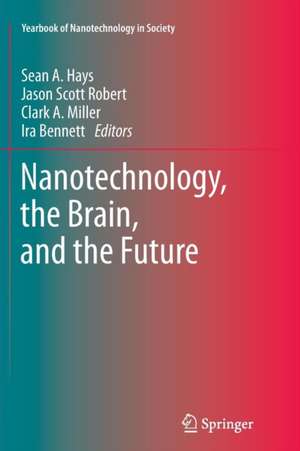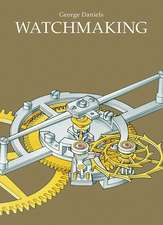Nanotechnology, the Brain, and the Future: Yearbook of Nanotechnology in Society, cartea 3
Editat de Sean A. Hays, Jason Scott Robert, Clark A Miller, Ira Bennetten Limba Engleză Paperback – 21 sep 2014
| Toate formatele și edițiile | Preț | Express |
|---|---|---|
| Paperback (1) | 646.11 lei 6-8 săpt. | |
| SPRINGER NETHERLANDS – 21 sep 2014 | 646.11 lei 6-8 săpt. | |
| Hardback (1) | 649.87 lei 6-8 săpt. | |
| SPRINGER NETHERLANDS – 14 aug 2012 | 649.87 lei 6-8 săpt. |
Preț: 646.11 lei
Preț vechi: 760.13 lei
-15% Nou
Puncte Express: 969
Preț estimativ în valută:
123.63€ • 129.43$ • 102.30£
123.63€ • 129.43$ • 102.30£
Carte tipărită la comandă
Livrare economică 05-19 aprilie
Preluare comenzi: 021 569.72.76
Specificații
ISBN-13: 9789401784139
ISBN-10: 9401784132
Pagini: 412
Ilustrații: XII, 400 p.
Dimensiuni: 155 x 235 x 22 mm
Greutate: 0.58 kg
Ediția:2013
Editura: SPRINGER NETHERLANDS
Colecția Springer
Seria Yearbook of Nanotechnology in Society
Locul publicării:Dordrecht, Netherlands
ISBN-10: 9401784132
Pagini: 412
Ilustrații: XII, 400 p.
Dimensiuni: 155 x 235 x 22 mm
Greutate: 0.58 kg
Ediția:2013
Editura: SPRINGER NETHERLANDS
Colecția Springer
Seria Yearbook of Nanotechnology in Society
Locul publicării:Dordrecht, Netherlands
Public țintă
ResearchCuprins
I. Introduction and key resources.-
1. Nanotechnology, the brain, and the future: Anticipatory governance via end-to-end real-time technology assessment
Jason Scott Robert, Ira Bennett, and Clark A. Miller.-
2. The complex cognitive systems manifesto
Richard P. W. Loosemore.-
3. Analysis of bibliometric data for research at the intersection of nanotechnology and neuroscience
Christina Nulle, Clark A. Miller, Harmeet Singh, and Alan Porter.-
4. Public attitudes toward nanotechnology-enabled human enhancement in the United States
Sean Hays, Michael Cobb, and Clark A. Miller.-
5. U.S. news coverage of neuroscience nanotechnology: How U.S. newspapers have covered neuroscience nanotechnology during the last decade
Doo-Hun Choi, Anthony Dudo, and Dietram Scheufele.-
6. Nanoethics and the brain
Valerye Milleson.-
7. Nanotechnology and religion: A dialogue
Tobie Milford.-
II. Brain repair.-
8. The age of neuroelectronics
Adam Keiper .-
9. Cochlear implants and Deaf culture
Derrick Anderson.-
10. Healing the blind: Attitudes of blind people toward technologies to cure blindness
Arielle Silverman.-
11. Ethical, legal and social aspects of brain-implants using nano-scale materials and techniques
Francois Berger et al. .-
12. Nanotechnology, the brain, and personal identity
Stephanie Naufel.-
III. Brain enhancement.-
13. Narratives of intelligence: the sociotechnical context of cognitive enhancement
Sean Hays.-
14. Towards responsible use of cognitive-enhancing drugs by the healthy
Henry T. Greeley et al. .-
15. The opposite of human enhancement: Nanotechnology and the blind chicken debate
Paul B. Thompson .-
16. Anticipatory governance of human enhancement: The National Citizens’ Technology Forum
Patrick Hamlett, Michael Cobb, and David Guston
a. Arizona site report
b. California site report
c. Colorado site reportd. Georgia site report
e. New Hampshire site report
f. Wisconsin site report.-
IV. Brain damage.-
17. A review of nanoparticle functionality and toxicity on the central nervous system
Yang et al. .-
18. Recommendations for a municipal health and safety policy for nanomaterials: A Report to the City of Cambridge City Manager
Sam Lipson .-
19. Museum of Science Nanotechnology Forum lets participants be the judge
Mark Griffin .-
20. Nanotechnology policy and citizen engagement in Cambridge, Massachusetts: Local reflexive governance
Shannon Conley.-
1. Nanotechnology, the brain, and the future: Anticipatory governance via end-to-end real-time technology assessment
Jason Scott Robert, Ira Bennett, and Clark A. Miller.-
2. The complex cognitive systems manifesto
Richard P. W. Loosemore.-
3. Analysis of bibliometric data for research at the intersection of nanotechnology and neuroscience
Christina Nulle, Clark A. Miller, Harmeet Singh, and Alan Porter.-
4. Public attitudes toward nanotechnology-enabled human enhancement in the United States
Sean Hays, Michael Cobb, and Clark A. Miller.-
5. U.S. news coverage of neuroscience nanotechnology: How U.S. newspapers have covered neuroscience nanotechnology during the last decade
Doo-Hun Choi, Anthony Dudo, and Dietram Scheufele.-
6. Nanoethics and the brain
Valerye Milleson.-
7. Nanotechnology and religion: A dialogue
Tobie Milford.-
II. Brain repair.-
8. The age of neuroelectronics
Adam Keiper .-
9. Cochlear implants and Deaf culture
Derrick Anderson.-
10. Healing the blind: Attitudes of blind people toward technologies to cure blindness
Arielle Silverman.-
11. Ethical, legal and social aspects of brain-implants using nano-scale materials and techniques
Francois Berger et al. .-
12. Nanotechnology, the brain, and personal identity
Stephanie Naufel.-
III. Brain enhancement.-
13. Narratives of intelligence: the sociotechnical context of cognitive enhancement
Sean Hays.-
14. Towards responsible use of cognitive-enhancing drugs by the healthy
Henry T. Greeley et al. .-
15. The opposite of human enhancement: Nanotechnology and the blind chicken debate
Paul B. Thompson .-
16. Anticipatory governance of human enhancement: The National Citizens’ Technology Forum
Patrick Hamlett, Michael Cobb, and David Guston
a. Arizona site report
b. California site report
c. Colorado site reportd. Georgia site report
e. New Hampshire site report
f. Wisconsin site report.-
IV. Brain damage.-
17. A review of nanoparticle functionality and toxicity on the central nervous system
Yang et al. .-
18. Recommendations for a municipal health and safety policy for nanomaterials: A Report to the City of Cambridge City Manager
Sam Lipson .-
19. Museum of Science Nanotechnology Forum lets participants be the judge
Mark Griffin .-
20. Nanotechnology policy and citizen engagement in Cambridge, Massachusetts: Local reflexive governance
Shannon Conley.-
Recenzii
From the reviews:
“The text goes through a review of new technology relating to biophysical, electronic, neurophysiology, and cognitive enhancement pertaining to this burgeoning field of Nanotechnology as relating to brain research. The authors do an excellent job on discussing some of the moral, ethical, and religious discussions now being made with reference to this subject. … I highly recommend this book to all audiences.” (Joseph J. Grenier, Amazon.com, November, 2013)
“The text goes through a review of new technology relating to biophysical, electronic, neurophysiology, and cognitive enhancement pertaining to this burgeoning field of Nanotechnology as relating to brain research. The authors do an excellent job on discussing some of the moral, ethical, and religious discussions now being made with reference to this subject. … I highly recommend this book to all audiences.” (Joseph J. Grenier, Amazon.com, November, 2013)
Textul de pe ultima copertă
Our brain is the source of everything that makes us human: language, creativity, rationality, emotion, communication, culture, politics. The neurosciences have given us, in recent decades, fundamental new insights into how the brain works and what that means for how we see ourselves as individuals and as communities. Now – with the help of new advances in nanotechnology – brain science proposes to go further: to study its molecular foundations, to repair brain functions, to create mind-machine interfaces, and to enhance human mental capacities in radical ways. This book explores the convergence of these two revolutionary scientific fields and the implications of this convergence for the future of human societies. In the process, the book offers a significant new approach to technology assessment, one which operates in real-time, alongside the innovation process, to inform the ways in which new fields of science and technology emerge in, get shaped by, and help shape human societies.
Caracteristici
The first assessment of the convergence of neuroscience and nanotechnology, its implications for the brain, and the social and ethical questions to which it gives rise A novel approach to real-time assessment of new and emerging technologies The first serious empirical analysis, using quantitative and qualitative methods, of the potential for and societal ramifications of human cognitive enhancement















